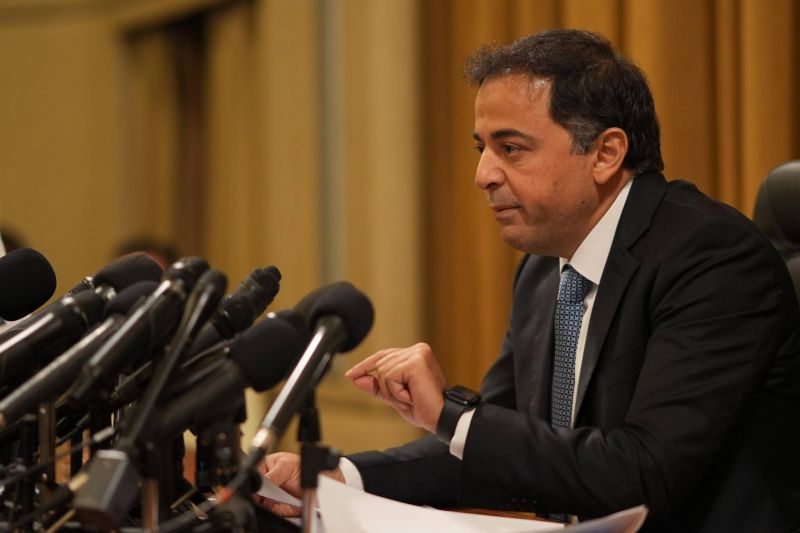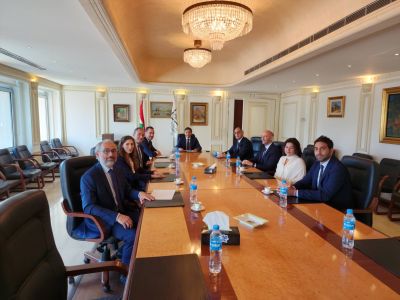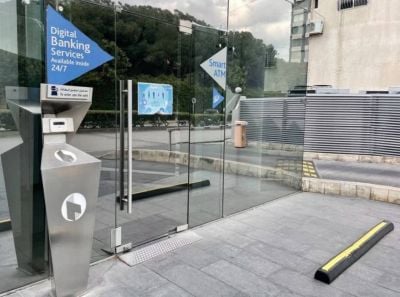
Acting BDL Governor Wassim Mansouri speaks at a conference in Beirut on Aug. 25, 2023. (Credit: Mohammed Yassin/L'Orient Today)
BEIRUT — Saudi Arabia will "always play a positive role" in helping Lebanon climb out of its years-long financial crisis, Lebanon's acting central bank governor Wassim Mansouri said Monday, on his first official visit to Riyadh.
Mansouri's remarks, on the sidelines of the Arab Banking Conference, also mark the first visit by a Banque du Liban (BDL) governor abroad since Lebanon spiraled into financial ruin in late 2019.
He noted to the Al Arabiya television network at the conference that “a historic relationship ties” the two countries together.
Mansouri succeeded former, disgraced BDL Governor Riad Salameh on July 31.
Salameh is held responsible by some politicians and a segment of the population for creating the financial crisis. He currently faces prosecution in Lebanon and several European countries for alleged corruption; however, he has consistently denied all charges against him.
Saudi Arabia has been one of the most critical countries to Lebanon’s ruling class and is also a potential major investor in Lebanon. KSA however regularly calls on Lebanese authorities to adopt reforms.
The kingdom has been less politically present in Lebanon for several years, in protest against Iranian hegemony over the country via Hezbollah.
Local actors, in search of funding to emerge from four years of crisis, are hoping for Riyadh’s political return to Lebanon with the election of a new head of state.
‘Returning money to depositors not impossible’
“Returning the funds to depositors is not impossible, and depositors should not have to wait for an extended period,” Mansouri also said to Al Arabiya, without providing more details on a potential mechanism to do so.
Banks in Lebanon have imposed illegal restrictions on their clients since the start of the crisis in 2019.
Mansouri added that "the Lebanese economy has declined from approximately $55 billion to around $20 billion," pointing out that the crisis can only be resolved through extensive coordination between technical, legal and political authorities.
Platform via Bloomberg
He also mentioned that BDL plans to provide a new exchange platform via Bloomberg.
“The central bank is seeking to introduce a new currency exchange platform through Bloomberg, instead of Sayrafa,” Mansouri explained.
BDL had already said it would phase out its own exchange platform, known as Sayrafa, and was considering Bloomberg as a substitute following concerns about Sayrafa's lack of transparency and governance.
Last month, BDL stated that the country's liquid foreign currency assets amounted to $8.573 billion, while external commitments reached $1.27 billion. This was the bank's first disclosure of these figures.
According to calculations by Reuters based on the bank's numbers, the net foreign currency assets in the country amounted to $7.303 billion.
‘We will not fund the Lebanese state, neither in lira nor dollars’
Mansouri explained that there were three steps needed to attract foreign and Lebanese investors again: “We need to leave the cash economy gradually and enter the [payments through banking system], build a [stable] banking system in the country and return the money of depositors or else there will be no trust in the whole banking sector.”
“Our decision is final not to fund the Lebanese state, neither in lira nor in dollars,” he said.
“If we pass laws that regulate the way the financial system works, and return the depositors' money, we can attract both Lebanese and non-Lebanese investors,” Mansouri added.
Previously, he said Saturday in an interview with Asharq al-Awsat that he "will not lend the Lebanese state the people’s money."
Since Lebanon's economy began to unravel in 2019, the national currency's value has severely depreciated against the US dollar on the parallel market. Depositors have been locked out of their bank savings and families have been pushed into poverty.
But the country has failed to enact reforms demanded by the International Monetary Fund to gain access to $3 billion in aid.
On Aug. 25, during a press conference, the acting BDL governor said that Lebanon's central bank would not print money to lend the state or cover the crisis-hit economy's projected deficit. He said that further delaying reforms "risks isolating the country from the global financial system."
A financial crime watchdog this year warned Lebanon could be placed on a gray list under special scrutiny over unsatisfactory practices to prevent money laundering and terrorism financing unless it enacted reforms.

